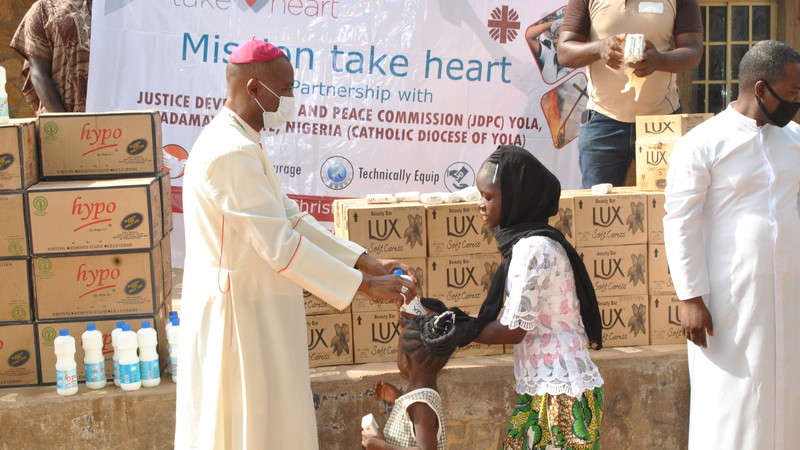Saint Peter and Saint Paul: the way to rebuild

Francis Stewart from our Theology team reflects on how we can learn from Saints Peter and Paul, especially as we look to rebuild our world after coronavirus.
This weekend we celebrate the feast of the apostles Saint Peter and Saint Paul. Throughout the Easter season, leading up to Pentecost, many Catholics will have been reading and listening to passages from the Acts of the Apostles. The charisma and perseverance of Saint Peter and Saint Paul, in unity with the other apostles, shines through here. They spread resurrection joy to Jews and gentiles, women and men, slaves and freepersons.
In many ways, amidst a global crisis, there couldn’t have been a more consoling piece of scripture to be reading. Acts is full of stories of healing and hospitality, contrasting with our situation of illness and isolation.
Finding hope
Yet, at the Feast of Pentecost the gospel readings took us back to Holy Saturday. Here we found the disciples huddled together in the upper room, despondent, frightened to go outside. I imagine they were contemplating how things could have gone so wrong. How could this man from Nazareth, claiming to be the Messiah, showing such promise to deliver the poor, the downtrodden, end up crucified as a criminal?
For me, this leaves a question: from this place of crushing failure and grief, how did the apostles find hope and rebuild their lives?
It was into that place of despair that Jesus entered in, bringing peace and breathing on them the Holy Spirit, the power to forgive sins. The resurrection is not a one-off event, setting things right again instantly. What we find in the gospel narratives is that it takes Jesus repeated visitations -on the road to Emmaus, on the seashore – to tend the crushed spirits of the apostles, to give them hope and coax them into standing up and taking collective responsibility to rebuild.
Find out how you can be a sign of hope for our world this summer
Rebuilding from rock bottom
Peter and Paul in particular had to rebuild from rock bottom. Paul (originally Saul) was a contract-killer of Jesus’ followers. Peter was named the rock upon which the Church was built, and yet denied Christ three times.
If Peter was not flawless, what is it that makes him “the rock” on which the Christian community was built and rebuilt?
In his own writings, Peter called the followers of Christ to be living stones, like Jesus, who was a stone rejected by men, but precious to God (1 Peter 2:4-5). This draws on the metaphor of Psalm 128:22 to express the character of a community built upon Christ: “the stone which the builders rejected, has become the cornerstone.”
The placing of those who are rejected at the front and centre of life is the pattern of any community built on the resurrection. According to the Book of Acts, the apostles sold their possessions and distributed the money to all who had need (Acts 4:35). Jesus’ teaching seems to have this as a principle of any authentic rebuilding.
When Jesus provocatively told the religious authorities of his day, “destroy this temple, and I will raise it up in three days” (John 2:19) he spoke in a many-layered metaphor. This was not about replacing an old religion with a new one. Rather that a system that cheats the widows and neglects the poor and the sick is built on shaky foundations. It is set to crumble.
Building back better
At CAFOD, when responding to emergencies like the coronavirus crisis, we seek not just to address the immediate needs of people and communities. We also work to support them to “build back better”. Disasters and crises often reveal underlying vulnerabilities which were there all along. Being part of long-term relationships with partners, we can accompany people to rebuild their lives and be more resilient.

In Brazil, the pandemic is having particularly devastating effects. Because of the lockdown’s closure of many sectors of the economy many people are going hungry. Our partners are lobbying the government and offering the produce of smaller, more sustainable farms as part of the effort to get emergency food to those in need. The agricultural techniques of these farmers conserve and enhance natural resources and water, soils and natural vegetation.
Here, amidst the crisis there is a window of opportunity to recognise previously marginalised ways of making a living, raising them up as a crucial piece of the alternative future we must now build.
Find out more about how coronavirus is affecting Brazil and donate to our Coronavirus Appeal
As we start to recover from a health crisis, we are still in the midst of its fallout: an economic, moral, spiritual, and ecological crisis. Whatever world is rebuilt from these ashes must have as its cornerstone those who have been rejected and neglected.
As Jesus said, “whatsoever you do to the least of these, you do unto me” (Matthew 25:45).
Pray with us for all those affected by coronavirus throughout the world